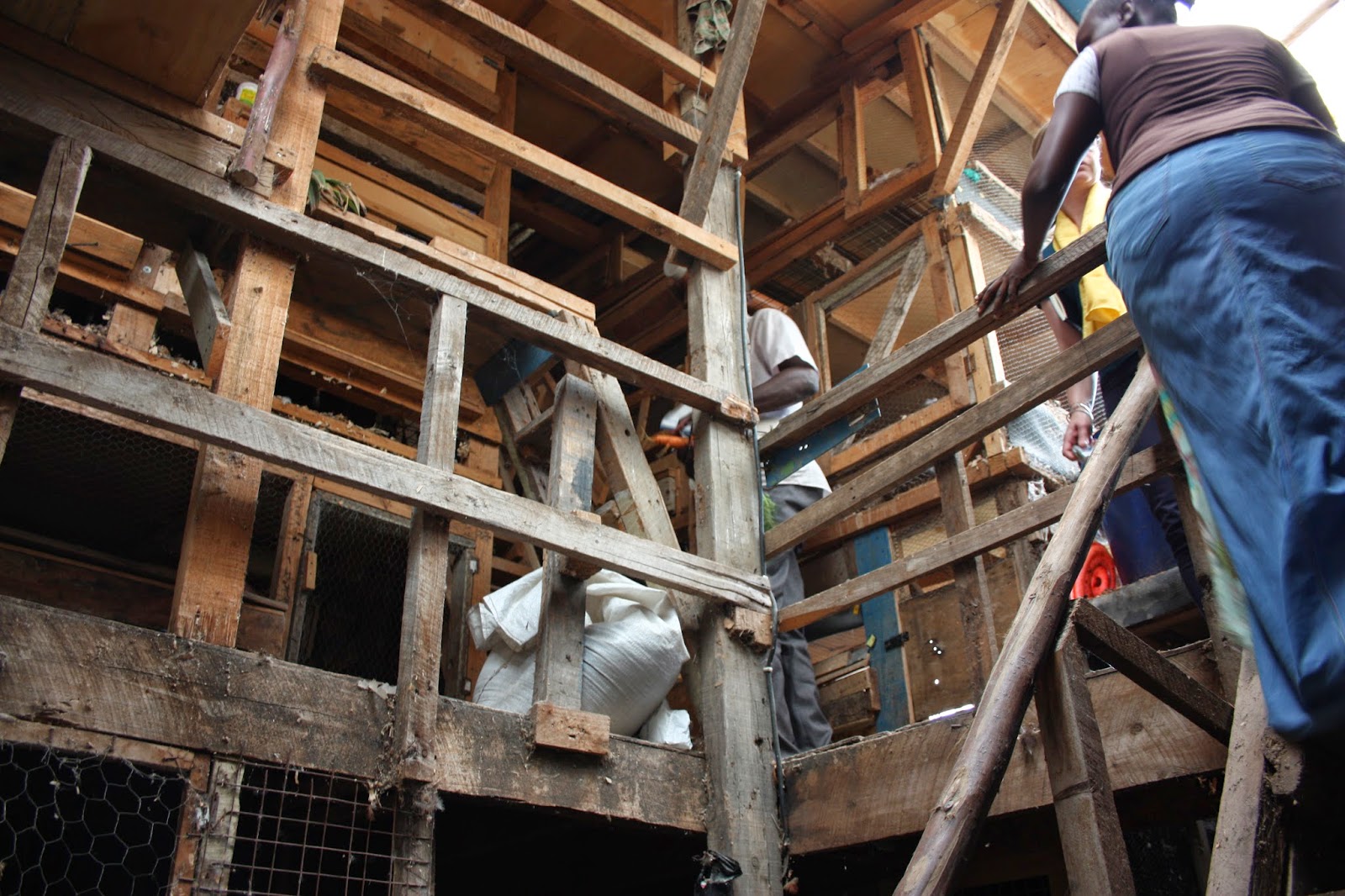Today our team visited a number of women’s groups in
Embakasi, a constituency within Nairobi, who’ve borrowed from Women Enterprise
Fund. This was a much anticipated outing for our #ibmcsc Kenya team - we've been diving deep into how WEF's operating model but hadn't yet met any of its beneficiaries.
We were guided by the energetic
and inspirational
Tom
Makisa, one of 292 WEF Officers who identify and train women’s groups,
facilitate loan applications, and follow up with women’s groups to ensure they
are benefiting from (and repaying) the loans.
 |
| Tom shows us his office - and his stack of loan applications that need to be submitted. His is a big job. |
Tom covers about 174 groups in Embakasi Constituency, which
covers an enormous amount of territory. Of
course it’s not humanly possible to meet regularly with each of these groups,
and in fact Tom estimates that only about 20 of them are highly active and
engaged. Yet he’s responsible for
needling all 174 groups who’ve borrowed from WEF at one time or another to
repay, as well as train new groups and follow up with groups WEF has already lent
to. He’s got a stack of new loan
applications six inches high that he’s helped the groups fill, and now has to
get the local committees’ sign off on, before passing them along to the
regional office to be keyed into the system for approval by headquarters. It’s a big job, and takes a lot of heart,
energy, and passion.
 |
| Embakasi includes some areas that feel like a cross between urban and rural |
 |
| The senior member of Kangarue group shared words of wisdom with us. |
Our first visit was to
Sarah Itambo at
Wisna
Farm. She is a member of a group that’s received a loan from WEF to raise
quails.
She rents space to the group on
her highly efficient urban farm on her parents’ property in Nairobi, and
participates with the group in the daily upkeep as well as finding local
markets for the quail eggs – and now that the prices for quail eggs have
dropped, often the quail themselves.
She’s an expert in urban agriculture.
She showed us the space where she keeps chickens, rabbits, and quails –
an incredibly efficient use of space.
She’s also got a greenhouse for raising herbs and other vegetables, and
tanks for fish farming.
Not only has she
turned a small space into a highly productive farm, she’s turned it into an
educational platform and information exchange.
She conducts trainings and hosts farm visits
(at a price, of course) and has traveled outside Kenya to share her knowledge
and learn about urban agriculture practices around the country.
 |
| Sarah shows us a few of her crops. Carrots here. Herbs in the greenhouse. Multiple varieties of chickens and quails in her hen house. Catfish in a fish pool. Many other things. She practices what you might call 'agile farming' - constantly changing and adding new crops and livestock according to what's demanded in the market. |
One thing she told us is that her farm is constantly
changing – she’s constantly closing down projects and starting new ones. I suspect that’s one of the keys to her
success. The fact is that markets always
have and always will fluctuate. Tastes
change, competitors enter and exit markets, etc etc etc. When you have a small space like Sarah has
you can’t bank on one crop to make your living on year after year. You’ve got to diversify and you’ve got to be
flexible and agile.
A case in point is the quail egg phenomenon. About a year ago we’re told quail eggs became
a fashionable thing to eat. Restaurants
and hotels were demanding them in great numbers, and few farmers had them. Eggs were sold at 150-200Ksh (around US $2-3)
each. Farmers that began raising them
were making a killing, selling dozens per day, at a cost of under 5 Ksh per egg
to produce. But as word spread lots of
farmers started producing quail eggs, and the prices went down to 10-15Ksh per
egg just as quickly.
We also visited four other groups: Youth for Change Network
which has used its WEF loan to acquire machinery to produce peanut butter for
sale locally, Vilisho – a group of women who’s used their WEF loan to start a
fish farming operation, Mwako Mpya who are using the loans to produce beautiful
handicrafts, and Kangarue who are using the loan urban agriculture including
fish farming, rabbit, chicken, and cow rearing.
Each faces its challenges – finding markets for its products and
operating fairly complex operations as a group of individuals volunteering
their time, to name a couple. Yet it
seems a lot of the value of these groups is in the social aspect of coming
together for a common purpose – “bringing women out of the house” as one of the
members put it.
 |
| Evelyn of Vilisho group shows us the group's water filtration system it recently added to its fish farming operation. |
 |
| Catfish! |
 |
| One of Youth for Change Network's officers demonstrates the group's peanut butter making equipment |
And come out of the house they did – about 20 Mwako Mpya and
Kangarue group members treated us to a welcome song and dance before showing us
around their farm. They couldn’t have
been more welcoming.
 |
| A welcome song and dance from the Mwako Mpya and Kangarue groups. |

































